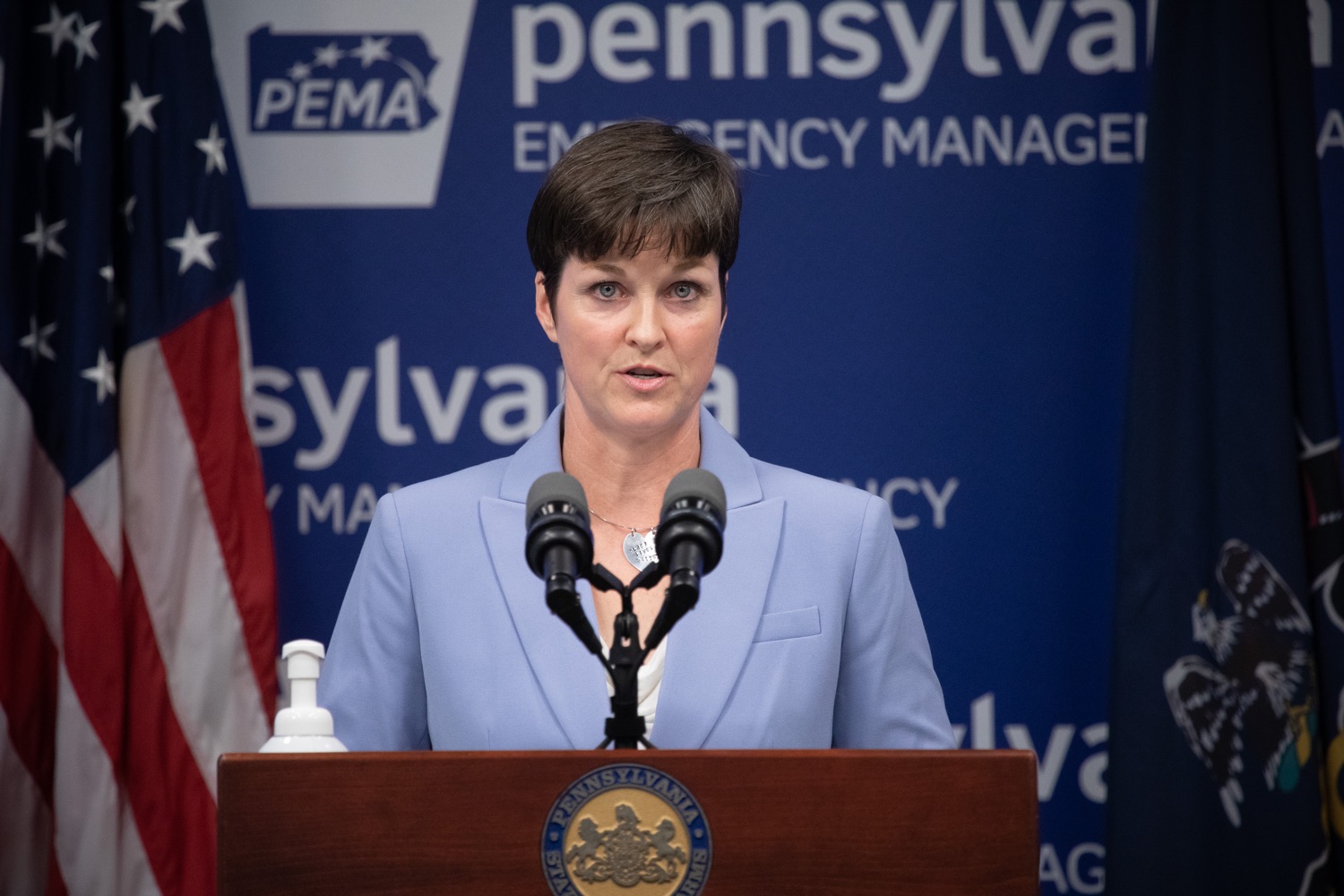
Secretary of Human Services Teresa Miller answers questions from the press.Governor Tom Wolf announced that people with intellectual disabilities and autism and the providers of support services for these vulnerable Pennsylvanians will receive $260 million in CARES Act funding to help continue to provide services during the COVID-19 pandemic. Gov. Wolf was joined by Department of Human Services Secretary Teresa Miller, who outlined to details of funding allocations. JUNE 15, 2020 – HARRISBURG, PA
Harrisburg, PA – Department of Human Services (DHS) Secretary Teresa Miller today recognized and thanked DHS employees who staff Pennsylvania’s hotline for reporting suspected cases of child abuse and neglect for their exceptional contributions and continued sacrifices during the COVID-19 pandemic. The 74-person ChildLine team has been working remotely since March to prevent the spread of COVID-19.
“When a ChildLine caseworker answers the phone, they know that the person on the other end is likely to report suspected child abuse or general concern about a child’s welfare. This is grueling and emotionally taxing work in the very best of times,” Secretary Miller said. “ChildLine workers also understand that when they answer a phone, it may be the first step in a process that saves a child’s life. Since March, those phones have been ringing in their own homes, around their own families. But they always pick up. On behalf of all Pennsylvanians, I want ChildLine’s caseworkers to know we recognize and appreciate the sacrifices they’ve made to protect children.”
Throughout the pandemic, state agencies have followed guidance for businesses issued by the Governor and Secretary of Health, including the recommendation for employees to telework, if possible. Approximately one-third of commonwealth employees are either teleworking full-time or splitting their time between telework and working onsite based on their job duties, enabling critical services to continue for millions of Pennsylvanians.
DHS recognizes the exceptional work of all ChildLine caseworkers and supervisors and in addition would like to highlight the contributions of these particular individuals who work to support ChildLine operations:
- Sarah Treven, a human services program specialist, has trained 18 new ChildLine staff members virtually since March. Before the pandemic, all training was done in person. Ms. Treven converted all of her training lessons into a remote learning experience and has continued to adapt to ensure that all new caseworkers are quickly and fully trained to begin the important work of receiving and processing reports of child abuse.
- Elysa Springer, the director of the Systems and Data Management Unit within the Office of Children, Youth and Families, has been leading the IT initiatives for the entire child welfare system. Her management of the functionality of the Child Welfare Information System (CWIS) and resolution of technology challenges empowered ChildLine to operate remotely and keep children and youth safe.
- Heather Cleland, administrative assistant for ChildLine, coordinated ChildLine’s transition to remote operations. Ms. Cleland ordered necessary equipment, coordinated interviews, onboarded new hires and generally did the work of maintaining operations while ensuring the health and safety of ChildLine’s staff.
ChildLine is available 24/7 to anyone concerned for the safety or well-being of a child. To report a concern, call 1-800-932-0313.
“We all share the responsibility of protecting children in our communities from abuse and neglect. If you are concerned about a child, please call ChildLine right away,” Secretary Miller said. “I want Pennsylvanians to know that ChildLine caseworkers and supervisors are constantly monitoring calls and referring all reports to county agencies for investigation. Their commitment to this extremely difficult job was admirable before the pandemic, but the added burden of taking calls about child abuse from their homes for the past seven months deserves its own acknowledgment.”
“The adaptability and resiliency of commonwealth employees during this pandemic has been truly remarkable,” said Secretary of Administration Michael Newsome, whose office oversees human resources for state agencies. “They recognize the impact of their work on the lives of Pennsylvanians and how critical it is for that work to continue as we collectively battle COVID-19.”
Anyone can make a report to ChildLine by calling 1-800-932-0313. Permissive (non-mandated) reporters can make anonymous reports to ChildLine. Mandated reporters should report online at www.keepkidssafe.pa.gov.
DHS encourages all Pennsylvanians to learn more about the signs of potential abuse or neglect and make a report to ChildLine if they begin to suspect abuse or neglect. Reporters do not have to prove abuse and neglect, and reporting to ChildLine allows trained child welfare and law enforcement professionals to properly investigate cases of suspected abuse.
Signs of potential abuse or neglect can include:
- Numerous and/or unexplained injuries or bruises;
- Chronic, pronounced anxiety and expressed feelings of inadequacy;
- Flinching or an avoidance to being touched;
- Poor impulse control;
- Demonstrating abusive behavior or talk;
- Cruelty to animals or others; and,
- Fear of parent or caregiver, among others.
Pennsylvanians can learn more about the signs of potential abuse at www.keepkidssafe.pa.gov.
DHS also encourages parents and families who are struggling to cope during this time of crisis to reach out for help. Anyone struggling with mental health and in need of referrals to helpful programs can call Pennsylvania’s new Support & Referral Helpline, which is operated 24/7 by skilled caseworkers who can provide emotional support during this difficult period. The number to call is 1-855-284-2494. For TTY, dial 724-631-5600. Another helpful resource is the 2-1-1 hotline operated by the United Way, which can connect people and families to local resources that can help during the public health crisis.

